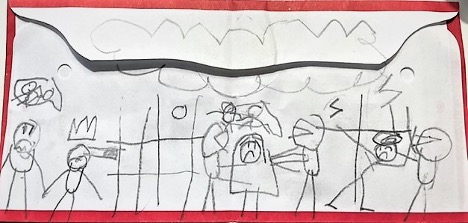There are more judgments from experts and pundits than there are cable channels with the rolling witness of deception and destruction in Ukraine. On a recent broadcast, an expert in geopolitics referred to military troops under authoritarian mindset as, “used, disposed, wasted.”
While my heart swells and tears fall as I watch images of soldiers rescuing victims from ravaged flooded lands or shouldering a crying child trying to survive in campaigns of violence, the opposite is true as troops following orders resort to the destruction of life in war. Life, as it is, gets in the way of some people’s plans.
Twenty-one years ago on September 11th, televisions were wheeled into high-school classrooms as students and teachers stared in disbelief at the images. Everything seemed surreal. I remember questioning the decision to have live feed of this destruction on television for anyone, every student to witness. This was the closest feeling to experiencing a war-at-home. Today, there are still bumper-stickers reminding others to “Never Forget”, yet how could anyone dismiss death, in New York or anywhere else its violence occurs? When you love, when anyone loves, it’s personal.
This late Saturday afternoon September 10th, I decided to attend church services. The sermon revolved around one of the most famous parables; that of the Prodigal Son. This story proposes a relationship between a lost son, a bereaved father, and the reaction of a “faithful” son, angered that the father forgave the wayward son and celebrated his return. The faithful son’s reaction is one of jealousy and malice. The priest made a point by saying, the parable does not make sense, unless you are the lost family member who is found! When one puts himself in the position of the “other”, a shift in perception may likely occur.
As church members rose to continue the service, my attention focused on a child of about 5 years old. He was intense, scribbling with a pencil on an offertory envelope.
At the end of the evening, choir and congregation sung a song based on the Prayer of St. Francis of Assisi – Make Me a Channel of Your Peace – proper for such an occasion during these times of tension in our world.
After the final stanza of the song, congregants left the pews. The artist-child left the scribbled offertory envelope on his seat as he sandwiched between his father and mother walking out of the church. I walked across the aisle and picked up the envelope, curious to enter the mind of a five-year old during these unusual times.
The envelope drawing reveals much more than any adult, including his parents, would have suspected. In the silence of our children, we can cultivate peace or violence. We have the choice, but we need the will to determine it with wisdom and grace.










